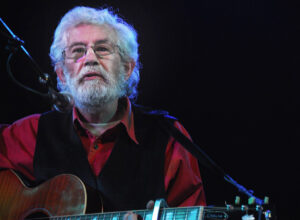 Jim Reid (5 May 1934 – 6 July 2009) was a singer, songwriter and guitarist who embodied the culture of the North East of Scotland.
Jim Reid (5 May 1934 – 6 July 2009) was a singer, songwriter and guitarist who embodied the culture of the North East of Scotland.
Reid was born and brought up in the Stobswell area of Dundee. Aged seven, it was his primary school teacher who first noticed his talent as a singer, entering him in a Burns competition which he duly won. At the time, such an achievement was lost on him, shrugging off the victory to go and play with his pals. Upon leaving school, Reid went first to work as a mechanic at his fathers’ garage, before going on to complete his national service with the Royal Electrical and Mechanical Engineers.
He had been interested in music since a young age – as well as his Burns victory, he learned pipes with the Boys Brigade, and listened voraciously to as much music he could – favourites over his teenage years included Ella Fitzgerald and Nat King Cole.
Whilst away on National Service, Reid chanced upon Seamus Ennis’s Irish radio program As I Roved Out. It was these half-hour Sunday morning broadcasts that really sparked his interest in folk music.
On returning to Dundee after completing his service, Reid started work for soft drinks manufacturer Robb Brothers, and joined The Shifters – a local folk band who’s name played on that of popular American group The Weavers. Shortly after, he started a duo with melodeon player Jim Craig – The Taysiders. In this they were joined by Ken McKay (who had previously played with The Livingstones) in 1971.
Shortly after, Reid moved from Dundee to Arbroath to take up a position with Irn-Bru manufacturers A.G. Barr. There he fell in with a crowd of local musicians who’d meet to play together at local haunt the Foundry Bar, Reid quickly becoming part of the regular sessions that would take place in the bars’ back room.
At Reid’s suggestion, some of those musicians put together a band to enter the TMSA’s Kinross Festival. Winning spurred them to form The Foundry Bar Band, which would allow Reid to pursue music full time. The band became weel-kent faces at festivals in Keith, Kirriemuir and Auchtermuchty, and were popular at weddings, ceilidhs and clubs across Scotland.
The band went on to release three albums on the Springthyme label, and Reid developed his links in the music community. He became a keen member of the Traditional Music and Song Association, helping to launch the Keith Folk Festival; and befriended folklorist Hamish Henderson, and the Stewarts of Blairgowrie, at one point standing in for Belle Stewart at a folk song camp in Massachusetts.
In 1984 Reid released his first solo album I Saw the Wild Geese Flee, which truly established him as one of the finest voices in Scottish folk music. The title track is his setting of Violet Jacobs’ poem Norland Wind, which has become much loved and widely sung, by artists including: Malinky, Lau, Frightened Rabbit, The Battlefield Band and Cilla Fisher.
Reid’s repertoire encompassed the traditional and self-penned, all rooted in Scots culture. His own writing ranged from the humorous to the sensitive and deeply insightful, and his renditions of traditional ballads would go on to have a great influence on the next generation of singers.
What followed was a fruitful career as a performer, recording artist and collaborator. Reid formed a duo with virtuoso accordionist John Huband (who had once performed with Stephane Grapelli at the Mathers Hall in Dundee), with whom he released Freewheeling Now in 1990. He returned to the songs of Robert Burns, contributing to the last four volumes of Linn Records’ landmark twelve disc project to record every song written or edited by Robert Burns, and contributed a rendition of Hamish Henderson’s iconic song The Freedom Come-All-Ye to A’ The Bairns O Adam – an album released in Henderson’s memory in 2003.
On the solo front, Reid made a number of further releases: The Better o’ a Sang (1996), Emfae Dundee (2001), and his final album Ayont The Tay (2005). In December that year, he was awarded Scots Singer of the Year at the Scots Trad Music Awards, aged seventy one. On the night, when accepting the award he first appeared reluctant to speak, but did so when prompted, saying “No’ afore time”. As Rob Adams wrote in his 2009 obituary for Reid: “Nobody would have mistaken it for arrogance. It was more a reluctant acknowledgement, in any case, from a quiet master who was always above anything so vulgar as bragging”.
